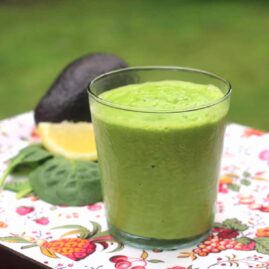Avocados are a popular food found in all kinds of cuisines. Humans have been consuming these fruits for at least 5,000 years.
But are avocados healthy for people with diabetes?
This article will explore the health benefits of avocados and will answer questions about avocados and diabetes.

Table of Contents
- What are the health benefits of avocados?
- Are there any downsides to eating avocados when you have diabetes?
- Can avocados lower your HbA1c?
- How many net carbs are in avocados?
- Does the carbohydrate count of avocados change as they ripen?
- Can a person with type 2 diabetes eat avocado every day?
- Final thoughts
What are the health benefits of avocados?
Vitamins and minerals
Avocados are an excellent source of healthy fats and essential vitamins and minerals, including:
- B vitamins (particularly B6, riboflavin [B2], niacin [B3], folate [B9], and pantothenic acid [B5])
- Potassium
- Magnesium
- Vitamins C, E, and K
These vitamins and minerals are important for critical functions such as maintaining a healthy brain, skin, and eyes.
They also help support your immune system and help to regulate blood pressure.
Some of the vitamins that are found in avocados are best absorbed from food, rather than supplements, meaning that eating these fruits is a particularly efficient way to increase your intake.
Other vitamins found in avocados, including vitamins E and K, are fat-soluble. This means your body absorbs them most easily when paired with healthy fats, which are conveniently also present in avocados.
Dietary fiber
Avocado is high in dietary fiber, which both improves digestive health and adds volume. This increases satiety (feelings of fullness) after meals, helping to prevent overeating.
These feelings of fullness tend to last longer compared to consuming the same number of calories from a low-fiber (or low-fat) meal, helping with both weight and blood sugar management.
Additionally, the fiber in avocados decreases the rate of digestion, which further helps slow the body’s absorption of carbohydrates and helps prevent blood sugar spikes after meals.
Studies have also shown that increasing dietary fiber intake reduces the risk of colorectal cancer.
Healthy fats
Avocados are an excellent source of healthful monounsaturated and polyunsaturated fats.
Monounsaturated and polyunsaturated fats have been shown to lower cholesterol levels, reduce inflammation, and improve heart health.
Along with fiber, the American Heart Association has found that most Americans also aren’t eating enough unsaturated fats.
Consuming avocados and other sources of healthy fats can help lower the risk of developing heart disease or having a stroke. (People with diabetes are twice as likely to have heart disease or a stroke as those without diabetes, according to the U.S. Centers for Disease Control and Prevention [CDC].)
Fats also tend to reduce the speed with which blood sugar levels change, reducing the likelihood of abrupt spikes and drops.
If you’ve ever worn a continuous glucose monitor (CGM) while eating a low-fat, low-fiber meal rich in refined carbohydrates, you’ve probably seen the rapid blood sugar spikes (and sometimes crashes) that can follow.
And not only do avocados contain fat, but they are also high in healthy types of fat known as monounsaturated and polyunsaturated fats. These can help lower blood cholesterol levels and reduce the risk of heart disease.
Carbohydrates
Avocados are low in carbohydrates, which means they have little effect on blood sugar levels. (One California avocado without the skin or pit has roughly 12 grams of carbohydrates.)
They are also very low in natural sugar, with one 136-gram California avocado containing roughly 0.41 grams.
Magnesium
Avocados are also a good source of magnesium. Research has found that increased dietary intake of magnesium helps to improve the body’s insulin sensitivity.
Are there any downsides to eating avocados when you have diabetes?
There are not many downsides to eating avocados for people with diabetes.
One thing to be aware of, though, is that avocados are calorie-dense, especially when compared to many other fresh fruits and veggies.
This is because of their high fat content. By weight, fat has more calories than protein or carbohydrates. (Carbohydrates have 4 calories per gram, protein has 4 calories per gram, and fat has 9 calories per gram.)
A whole, average/medium-size avocado has about 230 calories.
If avocados are not part of your meal plan already, it might be a good idea to incorporate them into your diet slowly, having them in place of other less-healthy foods, to avoid eating too many calories.
But with this caveat aside, avocados can be a delicious part of a healthy diet for people with diabetes. (Be sure to speak with your doctor or registered dietitian [RD] to get advice before making any major changes to your diet.)
Can avocados lower your HbA1c?
Some research has linked avocado consumption to improved health markers, including lower HbA1c (A1c) levels (a measure of glucose control over the previous 2 to 3 months) in overweight and obese people with insulin resistance (a condition in which the body does not use insulin efficiently).
Avocados are known to help decrease chronic inflammation (in which the body’s immune system is always overactive). There is research linking decreased inflammation levels in the body to lower overall A1c levels, at least among adults without diabetes.
Avocados are also a good source of magnesium, and research has found that magnesium helps make the body more insulin sensitive (able to more efficiently use insulin to convert blood sugar into energy).
So, while there currently isn’t definitive evidence, A1c does seem to be improved by consuming avocado.
How many net carbs are in avocados?
“Net carbs” is not a regulated term (nor is it officially recognized by the U.S. Food and Drug Administration [FDA] or the American Diabetes Association [ADA]), but it is generally understood to mean the number of carbohydrates that will eventually impact blood sugar levels.
Many people use net carbohydrate levels in making insulin-dosing decisions and determining what foods help them better manage their blood sugar levels.
In this case, net carbs would equal total grams of carbohydrates minus grams of fiber.
Harvard’s Nutrition Source estimates that an average/medium avocado has roughly 13 grams of carbohydrates and 10 grams of fiber.
Using the carbs minus fiber formula, this would mean a medium-size avocado has about 3 net carbs.
A large avocado could have as many as 5 net carbs (which is still quite low).
Does the carbohydrate count of avocados change as they ripen?
In avocados, the type and concentration of carbohydrates change as the fruit ripens and matures. At first, avocados have more complex carbohydrates like starch.
As the fruit ripens, these are broken down into simpler sugars, but avocados only have a slight increase in sugar content as the starches are converted.
This is in contrast to many other fruits that accumulate a significant amount of sugars as they ripen, like mangoes or bananas. So, the difference between the net carbs in unripe and ripe avocados is likely minimal.
Additionally, avocados are unique in that they primarily build up oil during the ripening process. As they mature, they accumulate healthy monounsaturated fats, which contribute to the creamy texture of ripe avocados.
Can a person with type 2 diabetes eat avocado every day?
Yes, it is generally fine to eat avocado each day if you have type 2 diabetes.
Because avocados are calorie-dense, it’s important to work with a registered dietitian or other medical professional for guidance on appropriate avocado portion sizes for your individual needs.
This will ensure that your overall diet is well-balanced and supports your health goals.
Because of the high fat content of avocados, it’s also important to talk with a doctor before adding them to your diet if you have conditions that impact your body’s ability to digest fats.
However, most people with diabetes will find there are very few downsides to eating a serving or two of avocado per day (roughly one-third to two-thirds of an avocado) as part of a healthy diet.
Avocado’s healthy fats, fiber, vitamins, and minerals make it a nutritious and delicious addition to many meals.
Final thoughts
Considering all their characteristics, avocados are overall a very beneficial food for people with diabetes. Their low carbohydrate content coupled with their high levels of fiber and healthy fats makes them an excellent choice for helping manage blood sugar levels and supporting general health.
The rich nutrient profile of these fruits, with their significant levels of various essential vitamins and minerals, also contributes to the important role they can play in a healthy diet.
Although their high calorie content means they must be carefully incorporated into a meal plan with an eye toward portion control, avocados are a versatile and healthy option for people with diabetes to consider including in their diet.








